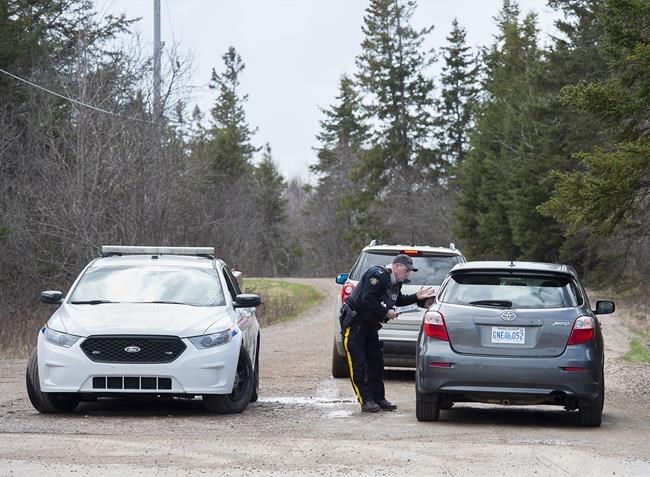HALIFAX — The morning after a gunman murdered 13 people in northern Nova Scotia, the RCMP were unaware he had resumed his killing until frantic 911 calls started coming in from two locations shortly after 9:30 a.m.
By that time, four more people had been shot to death, and the killer — driving a replica RCMP cruiser — was still at large.
Two documents released Wednesday by the inquiry investigating the rampage make it clear that as day broke on April 19, 2020, most Nova Scotians were unaware of the mayhem that had begun the night before.
"It's the time period when the perpetrator reactivated his rampage after a brief respite overnight," lawyer Roger Burrill told the federal-provincial inquiry.
The new documents state the killer spent the night of April 18, 2020 parked in Debert, N.S., then left before sunrise and drove about 40 kilometres to a home in West Wentworth, N.S. Surveillance camera footage indicates he arrived at the rural home of Sean McLeod and Alanna Jenkins on Hunter Road at 6:35 a.m.
Neighbours reported hearing gunfire at various times that morning, but it remains unclear exactly what happened on the secluded property between 6:35 a.m. and 9 a.m. Civilian and police investigators believe McLeod and Jenkins were fatally shot inside their home before it was set on fire.
The inquiry has heard the couple, who both worked in correctional institutions in northern Nova Scotia, were acquainted with the killer, whom police had identified the night before as 51-year-old Gabriel Wortman. The document does not speculate about a motive, but the RCMP have said the killer was likely an "injustice collector" bent on settling old grudges.
The inquiry's investigators believe neighbour Tom Bagley, a retired firefighter, was out for a morning walk some time after 8:50 a.m. when he noticed the burning home and tried to offer help. He was shot just outside the house before the killer left at around 9:20 a.m.
In a subsequent interview with his wife, Patsy, investigators learned Bagley had checked Facebook and the news before leaving for his walk, but there was no indication he or his wife learned anything about the killings the previous night in rural Portapique, N.S., about a 40-minute drive away.
The RCMP have faced intense criticism for the way they communicated with the public during their investigation in April 2020. In particular, questions have been raised as to why the Mounties failed to use the Alert Ready system to warn Nova Scotians about an active shooter.
The system can be used to transmit urgent messages on TV, radio and wireless devices. Some critics, including relatives of some victims, have said that the Mounties' use of Twitter to warn the public didn't make sense because people in rural settings rarely use that form of social media.
There has also been speculation that the RCMP did not step up their warnings on the night of April 18 because of a belief that the threat had passed once the shooting stopped in Portapique. The inquiry, which started hearings Feb. 22, has heard that some Mounties assumed the shooter had killed himself in one of the community's wooded areas on the first night.
It wasn’t until after 7:30 the next morning that police learned from Wortman’s common-law spouse that he had eluded capture and was driving a vehicle modified to look exactly like a marked RCMP patrol car.
At 8:02 a.m., the Mounties released a brief warning on Twitter, saying for the first time they were looking for an active shooter in the Portapique area. It wasn't until 10:17 a.m. that they warned on Twitter that the killer was driving a police car.
A resident on Hunter Road, April Dares, later told police she had spotted a “police cruiser” leaving the neighbourhood around 9:15 a.m. When she turned to Facebook to ask about the gunfire she had heard earlier that day, she learned about what happened in Portapique. She called 911 at 9:32 a.m. to report a possible connection between the two incidents.
Minutes later, another neighbour, Carlyle Brown, called 911 to report the growing house fire down the road and the sound of gunfire. Other neighbours also called in.
Adding to the chaos was another 911 call — recorded at 9:35 a.m. — from a woman in her Wentworth home who said she had just heard a gunshot, then spotted a police car driving away from a body left lying by the side of Highway 4 — about 15 kilometres south of Hunter Road.
While on the call, her husband reported the victim was dead.
It was at that point the RCMP realized where the killer was. At 9:42 a.m., officers in the area were alerted about the sighting of the suspect's car and the death of Campbell, who had been out for a morning walk when Wortman passed her on the highway, did a U-turn and drove back to shoot her.
"The perpetrator's whereabouts were unknown prior to ... the radio broadcasts about the homicide in Wentworth," the document says. Officers from across the region then joined the manhunt.
As for Campbell, her husband later told police that the couple had their computers, radio, TV and mobile phones on that morning before Campbell left for her daily walk, but had not heard about the events in Portapique.
Just after 11 a.m., Tom Bagley's burned body was found by neighbours next to the torched McLeod-Jenkins home in West Wentworth. The couple's remains were identified weeks later.
This report by The Canadian Press was first published March 30, 2022.
Michael MacDonald, The Canadian Press




